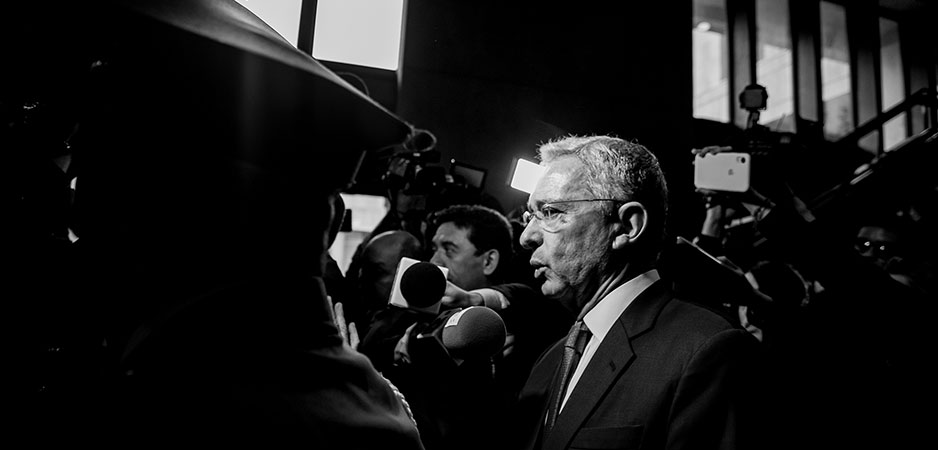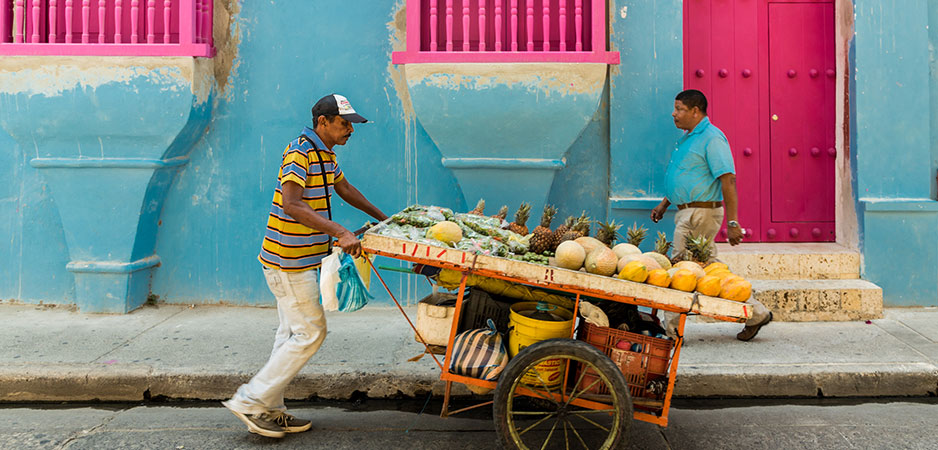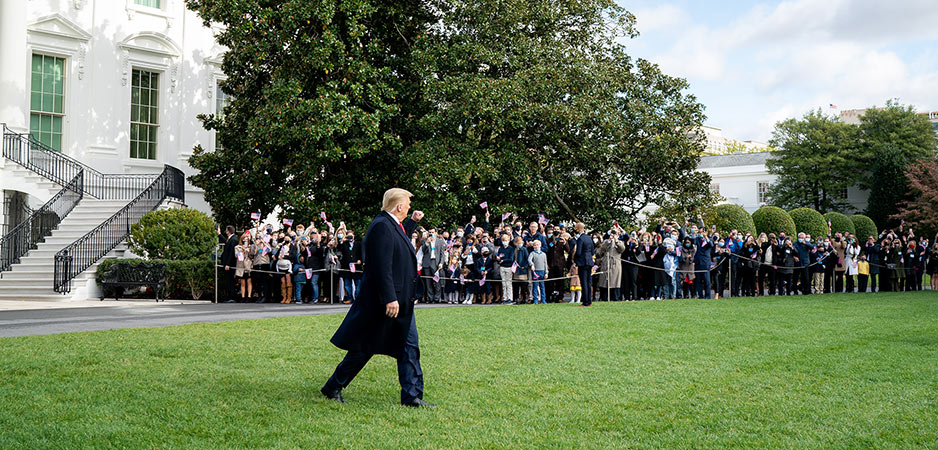On Tuesday, August 4, via a short and unassuming tweet, the former president of Colombia, Alvaro Uribe Velez, informed the world that he was placed under house arrest. The news sent shockwaves throughout South America’s political circles and sparked protests across Colombia. Uribe’s house arrest order, issued by the supreme court of justice as part of a case investigating witness tampering and false testimony, is surprising and problematic for several reasons.
For starters, it is the first time that a former president has been deprived of personal liberty in Colombia, a country where more than one recent head of state has questionable records, such as campaign financing by major drug cartels. Secondly, since March, Colombia has been in lockdown due to the COVID-19 pandemic, which means that individuals are for the most part already confined within their residences. Moreover, as former president and senator, Uribe doesn’t go anywhere in Colombia without a substantial security apparatus.
Defeating Systemic Corruption: Colombia’s Next Major Challenge
Thirdly, the former president is well known both nationally and internationally, which translates to extremely low flight risk and one that could have been addressed by merely confiscating his passport. Adding to the controversy of the supreme court’s order is the fact that, as recently as last year, individuals who pose actual security and flight risks, such as Revolutionary Armed Forces of Colombia (FARC) leaders Ivan Marquez and Jesus Santrich, were not preemptively detained despite probable cause and ended up fleeing Colombia to set up a dissident guerrilla movement.
Lastly, Uribe should be presumed innocent until proven guilty, like any other citizen, as outlined in Article 29 of Colombia’s Constitution. However, it seems that given his high profile and political history, the supreme court is treating the former president differently. This is problematic for the rule of law in Colombia.
Irregularities in the Process
Under Uribe’s presidency, Colombia’s security was largely restored, narco-terrorism was fought head-on by the national government, numerous FARC leaders were captured, over a thousand drug traffickers were extradited to the United States, and large paramilitary groups demobilized under the auspices of the Justice and Peace Law. Uribe’s work and legacy, much of which was implemented in close coordination with the United States at the time, is also recognized internationally. One of the global voices against Colombia’s former president’s house arrest is US Vice President Mike Pence, who, on August 14, tweeted in solidarity, asking that Uribe be allowed to “defend himself as a free man.”
Given his former status as senator, Uribe’s case, which happens to be against left-wing Senator Ivan Cepeda, had Colombia’s supreme court as its original jurisdiction, in accordance with Article 235 of the constitution. Specifically, this case began in 2012 when Uribe filed a legal complaint against Cepeda accusing him of paying bribes to imprisoned criminals in exchange for testimony that would incriminate the former president and his brother for paramilitary activities during Uribe’s time as mayor of Medellin and governor of Antioquia. In 2018, an election year in Colombia, the supreme court flipped the accusation and charged Uribe with allegedly paying witnesses to testify in his favor and against Cepeda.
Since its inception, the process against Uribe has been overly politicized and marred by irregularities, including the admission of illegally obtained wiretap recordings as evidence in the case. Over 20,000 illegal interceptions were made to Uribe’s cellphone, under a judicial order that was supposed to tap Congressmember Nilton Cordoba, not the former president. Making matters worse, as soon as the analyst from Colombia’s attorney general’s office in charge of the wiretap realized that the cellphone belonged to Uribe and not Cordoba, he notified his superiors. However, the illegal interceptions continued for nearly a month and were eventually submitted to the supreme court as evidence.
There is a history of animosity between the former president and members of Colombia’s supreme court of justice due to alleged wiretapping of the court’s premises as well as judges’ phones by the security services during Uribe’s presidency. Compounded by the evident lack of procedural guarantees for a fair trial, Uribe resigned his seat as senator shortly after he was placed under house arrest and triggered a jurisdictional change. His case has now been passed on to Colombia’s attorney general and a lower court, in which Uribe expects a less politicized and more fair trial.
The Need for Judicial Reform
Although Uribe’s house arrest remains in force until a new judge takes over the case and decides whether to revoke or maintain the preliminary detention, public outcry has been heard throughout the country. The most salient example of an institutional double standard is the recent case of FARC commanders like El Paisa, who were never placed under house arrest pending trial as part of the 2016 peace process and then escaped to take up arms again. Observing this precedent, the judicial measure against Uribe is disproportionate, particularly since the former president has attended all of his court hearings as scheduled and been responsive to judicial inquiries.
Finally, the controversy around the judiciary’s handling of Uribe’s case has rekindled the calls for constitutional reform in Colombia. Reforming the country’s complex judicial branch seems for many to be the only way to rescue the institutional mechanisms, which are currently failing within the Colombian justice system. In this time of uncertainty, the alternative of carrying out judicial reform would give a new direction to the presidency of Ivan Duque and would provide a unique opportunity for Colombia to emerge institutionally strengthened.
One of the main issues with Colombia’s judicial system is that the country has not one but three top courts: the supreme court of justice, the council of state and the constitutional court. Another problem lies with the fact that the members of both the supreme court and the council of state select their membership themselves, without much executive or legislative oversight, albeit in accordance with Article 231 of the constitution. Having such a closed and endogamous nature has led to judicial malpractice and corruption in Colombia’s judiciary, such as the infamous “Cartel of Robes” scandal that saw supreme court judges abuse their independence to derail cases and stifle investigations by the attorney general in exchange for hefty bribes.
While Alvaro Uribe’s case is likely to drag on for months, there is a higher likelihood that the process will have a lower profile and a more balanced outcome now that it has left the supreme court’s docket. Nevertheless, the judicial branch will now be increasingly seen as a politicized institution, and there are important voices in the country calling for both a consolidated supreme judiciary and a more transparent selection process for its members. Already in a bind due to the pandemic and its socioeconomic fallout, Colombia’s government must now address growing calls for constitutional reform in an increasingly polarized political climate.
The views expressed in this article are the author’s own and do not necessarily reflect Fair Observer’s editorial policy.
For more than 10 years, Fair Observer has been free, fair and independent. No billionaire owns us, no advertisers control us. We are a reader-supported nonprofit. Unlike many other publications, we keep our content free for readers regardless of where they live or whether they can afford to pay. We have no paywalls and no ads.
In the post-truth era of fake news, echo chambers and filter bubbles, we publish a plurality of perspectives from around the world. Anyone can publish with us, but everyone goes through a rigorous editorial process. So, you get fact-checked, well-reasoned content instead of noise.
We publish 2,500+ voices from 90+ countries. We also conduct education and training programs
on subjects ranging from digital media and journalism to writing and critical thinking. This
doesn’t come cheap. Servers, editors, trainers and web developers cost
money.
Please consider supporting us on a regular basis as a recurring donor or a
sustaining member.
Support Fair Observer
We rely on your support for our independence, diversity and quality.
Will you support FO’s journalism?
We rely on your support for our independence, diversity and quality.






